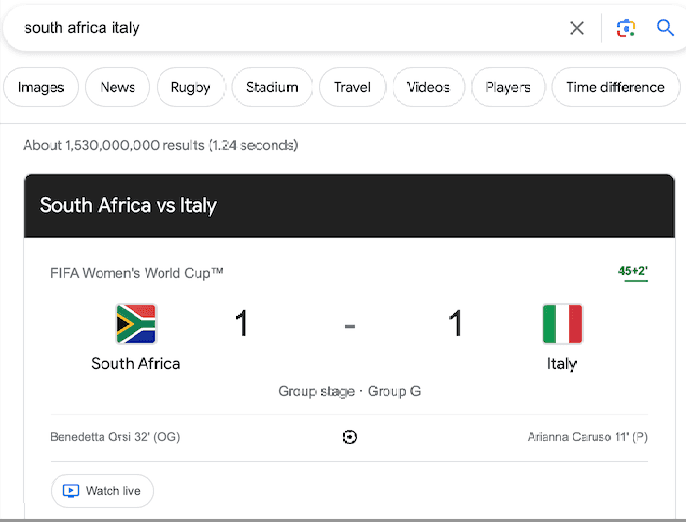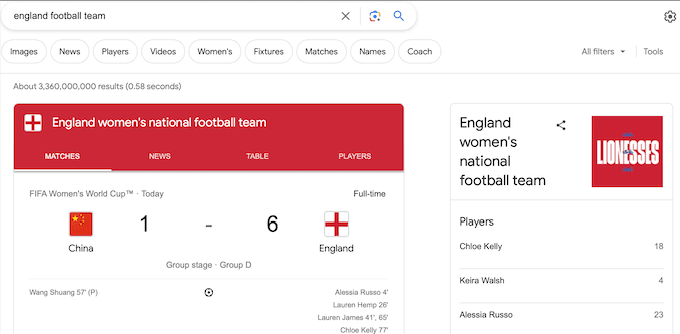We want Women's Sport. But can we get it?
"Too often women athletes don't get the attention they deserve"
This is Google’s Director of Product Management, Becks Wood. In a recent blog, Becks announced changes that Google have made to sort this.
The Women’s World Cup is a reminder of progress, when it comes to equity in sport. It’s the biggest standalone women’s sports tournament in history, by ticket sales alone.
To coincide with the tournament, Google says they’ve improved how they bring women’s sport information and coverage to this ready-and-waiting audience.
Not just for the Women’s World Cup, but beyond the tournament too...
The problem with 'Googling' stuff
The saying ‘just Google it’ is the answer to many of our problems. We’re stuck, we want information fast, and Google is always there.
But the slight hiccup here, is that Google - and all search engines for that matter - are what people call ‘biased’.
The results Google feeds you when you hit that return key is a tiny selection of the infinite amount of information that’s held on the web.
So this information isn’t the full picture - it’s a filtered one. And that can mean we get fed more results about men’s sport and male athletes, than we do about women’s sport.
So... we had a chat to Google
Last year, we went to speak to the Vice President of Search at Google, Pandu Nayak, to find out how search really works, and why it can appear ‘bias’. You can read that article here.
From talking to Pandu, this quote stood out to me.
"Algorithms aren’t making any value judgments here. They are very much dependent on the content that’s out there. And the content that’s out there is informed by societal biases"
Historically, online coverage of men’s sport has been much greater. And according to Google’s Director of Product Management Becks Wood, if there’s a prevalence of content about men’s sport, that might mean Google Search is more likely to surface this - over women’s sport.
The second part of that quote refers to societal biases. The more we see men’s sport, the more we interact with it, and the more the algorithms learn. And the more men’s sport we get.
How are Google making it easier to see women's sport?
The first big change Google has made is to expand the coverage of women’s competitions. In the past year, they’ve added more than 110 women’s leagues to the results page, helping you keep up to date with more women’s sports teams.

A screenshot of a results page from Google that shows the score of the South Africa v Italy match in the Group stage of the world cup tied at 1-1 during the first half
They’ve also focused on what Google calls ‘gender-ambiguous queries’ - for example, ‘England football team’ - when the search engine has to try and understand if it’s the men’s or women’s team you’re after.
We’re not sure exactly what those changes look like, but Google says they’re rolling out updates to make these gender ambiguous queries ‘more inclusive’.
Ultimately, a big factor in the whole ‘search bias’ equation is the amount of men’s sport content, compared to women’s sport content.
So Google says they’re working with content creators and news publishers to increase the amount of women’s sport media coverage.
What's the verdict?
I’m by no means a ‘techie’. So some sort of advanced ‘testing’ is a little beyond my capabilities…
But, I did pop in a few search queries to Google.
For example, the ‘gender ambiguous’ query, ‘England football team’. And sure enough, the top result is the England Women’s team, and their recent World Cup result.

I also punched in another couple of searches, along the lines of ‘best soccer player’, ‘top athletes’. Here’s my results.


They’re all men. I asked Google about why this is still the case, but they haven't responded.
You can also ‘Correct the Internet’
If you want to do a bit more digging around ‘search bias’ when it comes to sport, check out the ‘Correct the Internet’ campaign, who are working to directly change inaccurate search results.
If search engines are trained on human behaviour - and they’ve learnt our bias towards men’s sport - the campaign believes we can correct this.
They’ve built this very clever tool, which allows people like you and I to correct results, by logging feedback directly in Google.
We know the best athletes in the world aren’t all men. And search engines know this too - but they just need a little help surfacing that information for us.